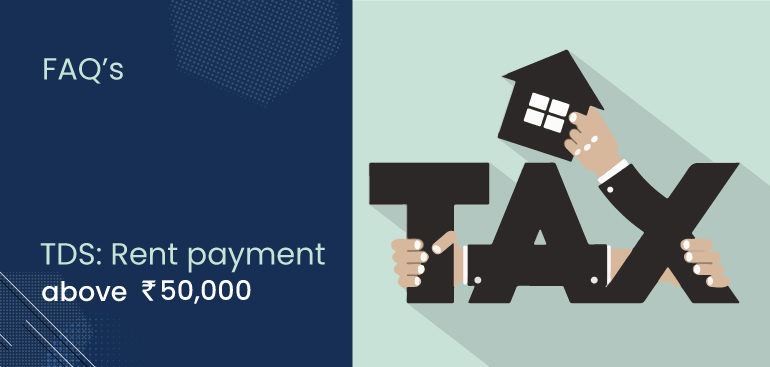As the government of India has emphasized more on tax to be deducted to ensure that the correct tax amount is deposited with the treasury of government and to avoid any loopholes for evasion of tax, under various provisions of Income Tax Act, it has become very important for the persons who are the payee of the amount to become more informed and vigilant about tax implications on the amount paid by them.
One of such cases is Section 194IB of the Income Tax Act, which can be applicable to any person not very much involved in the complication of taxpaying and tax calculation. One such example is a salaried employee who lives in a rented apartment. As per Section 194IB, any individual or HUF, who pays a rent of Rs 50,000 or above per month, will have to deduct TDS at the rate of 5% per annum of the rent paid.
Here are a few FAQs which can help solve the basis of this section.
Frequently Asked Questions
-
- When is Section 194IB applicable and to whom?
Section 194IB is applicable to any individual or HUF who are not required to get their books of accounts audited or to whom provision of the tax audit is not applicable and who pays a rent of Rs 50,000 or above per month for a property.
- What is the rate at which TDS is to be deducted?
TDS is to be deducted @ 5% of the rent paid. - When is the TDS to be deducted?
TDS is required to be deducted once in a year. It should be deducted in the last month of the financial year i.e. March. In a case where a property is vacated in between, TDS should be deducted when the property is vacated or the rent paid for the last month.
- When and How to pay TDS?
TDS, when deducted, should be deposited with the government’s account within 30 days from the end of the month in which tax is deducted. If the tax is deducted in the month of March, the tax should be deposited on or before 30th April. This tax should be deposited to the government’s account by filing Form 26QC.
- Is the tenant required to procure TAN to deduct TDS and file 26QC?
No. A tenant is not required to procure TAN. He /She can file form 26QC by quoting his /her PAN and also the PAN of his /her Landlord. - What is Form 16C?
Form 16C is the TDS certificate that is furnished by the tenant who deducts TDS from the rent paid. This certificate is furnished to the landlord of the property.
- From where can I get Form 16C?
Form 16C can be downloaded from the TDS portal. They are available after 3-7working days from filing Form 26QC.
- Can a tenant file Form 26QC and make the payment of TDS at a subsequent date?
Yes. A tenant can file Form 26QC and tax can be paid on a subsequent date. E-payment option is linked to the Form 26QC based on the Acknowledgement Number generated at the time of filing Form 26QC.
- Should a tenant file separate Form 26QC if the property is owned by two or more people?
Yes. Separate Form 26QC is to be filed by the tenant if he is paying separate rent to each owner by quoting the PAN of each landlord.
- Is there any interest applicable if the tenant fails to deduct TDS?
Yes. The interest of 1% per month shall become applicable for every month of delay.
- What happens if the tenant deducts the TDS but fails to deposit the same with the government?
A penalty of 1.5% per month is attracted for every month of delay.
- Is there any implication if the tenant does not file Form 26QC within the time limit?
Yes. Tenant shall have to pay a late fee of Rs 200 per day for delay in filing of Form 26QC.
- What will be the liability of a tenant if he fails to furnish Form 16C to the landlord?
The tenant will have to bear the penalty of Rs 100 day till the default continues.
- When is Section 194IB applicable and to whom?
Jitesh Telisara & Associates LLP, CA In Pune is a professionally managed firm catering to domestic and international clients with a broad range of services in domestic and international taxation, regulatory and advisory services and crosses border transaction-related services.
Our services: GST consultation, Chartered accountant, IT returns consultant, Corporate law, Taxation, Regulatory & Advisory Services.
Tags: CA In Kharadi, CA In Koregaon Park,

